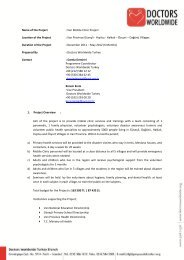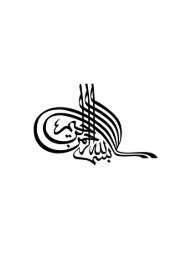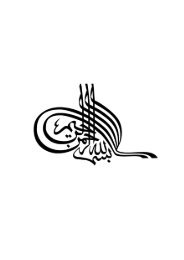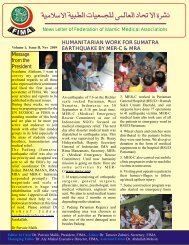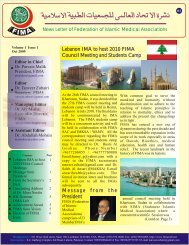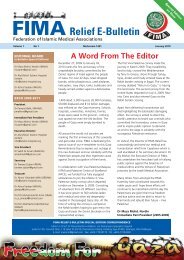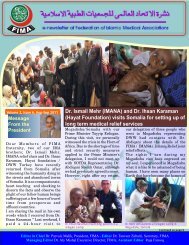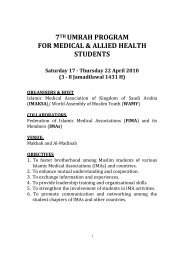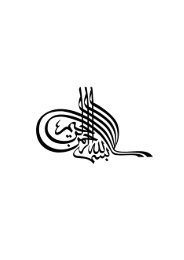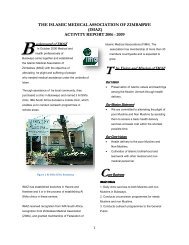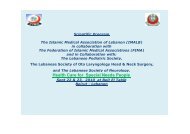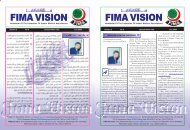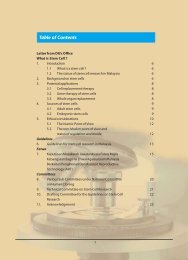FIMA Year Book 2009 - Federation of Islamic Medical Associations
FIMA Year Book 2009 - Federation of Islamic Medical Associations
FIMA Year Book 2009 - Federation of Islamic Medical Associations
You also want an ePaper? Increase the reach of your titles
YUMPU automatically turns print PDFs into web optimized ePapers that Google loves.
Inculcating <strong>Islamic</strong> Inputare closely observed from the verybeginning under the mentorshipprogram to ensure supervised trainingand assessment <strong>of</strong> their attitude andbehavior. Weekly reflection sessions<strong>of</strong> small groups <strong>of</strong> students with theirmentors facilitate the development <strong>of</strong>relationship among students and theirteachers. These sessions also help inidentifying the right attitudes expectedand monitoring <strong>of</strong> progress in achievingaffective domain outcomes. Reflectionon academic and non-academic issuesprovides a holistic perspective to theAffective domain. In addition, studentsare continuously exposed to various<strong>Islamic</strong> concepts and behaviors throughtalks, lectures, community activities andsharing <strong>of</strong> experiences.For the Knowledge domain, students areprovided access to information throughthe availability <strong>of</strong> online resources,library and web portals. Small groupteaching is the main teaching methodwhich provides close monitoring <strong>of</strong>students and identification <strong>of</strong> weakstudents to provide remedial measures.Student Centered Team-based Learning(SCTL) method engages studentsthrough various activities like drawingsand work books completion to enhancetheir memory and retention. ProblemBased Learning (PBL), Clinical SkillsTraining (CST) and Clinical Correlation(CC) courses provide thinking andproblem solving exercises under thesupervision <strong>of</strong> facilitators. Large classsessions provide a portal to conveyimportant topics to the whole class atonce to give them better understandingand planning <strong>of</strong> upcoming small groupsessions.Skills’ training is also conducted as aseparate course and explanation anddemonstration by experts is the mainstrategy adapted before allowing themto practice individually.Community and Health ExposureTraining (CHET) course, Personaland Pr<strong>of</strong>essional Development (PPD)course, Military medicine, Disasterand Relief Medicine (DRM), electivesfor both non-medical and medicalsubjects and voluntary work underYoung Mercy all contribute towards aholistic approach to the patient and thecommunity.Traditional and ComplimentaryMedicine (TCM) is another importantcourse to integrate <strong>Islamic</strong> and otheralternative treatment methods intomodern medicine.Introduction to research topics andencouragement to conduct researchduring electives is also in accordancewith the <strong>Islamic</strong> philosophy.Criterion based continuous formativeand summative assessment is helpfulin creating a collaborative learningenvironment instead <strong>of</strong> competitiveenvironment.This bird’s eye view analysis <strong>of</strong> CUCMScurriculum clearly indicates thedirection <strong>of</strong> education towards <strong>Islamic</strong>philosophy <strong>of</strong> medicine which is inaccordance with the Philosophy <strong>of</strong>CUCMS as well.There is still a need to introduce few<strong>FIMA</strong> <strong>Year</strong><strong>Book</strong> <strong>2009</strong>40




